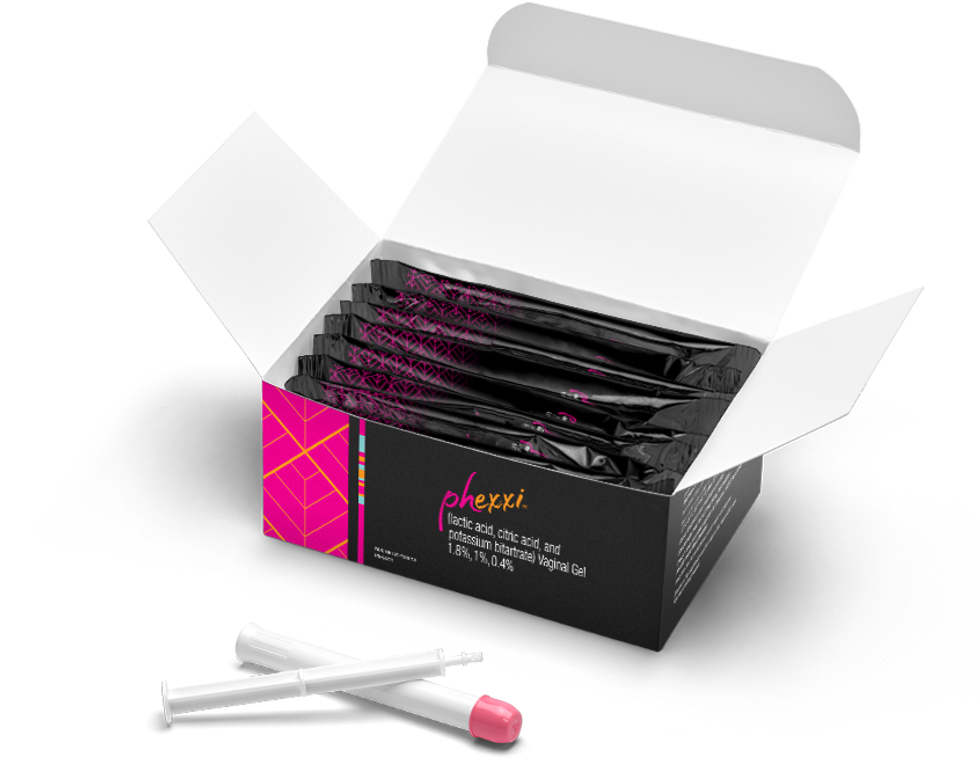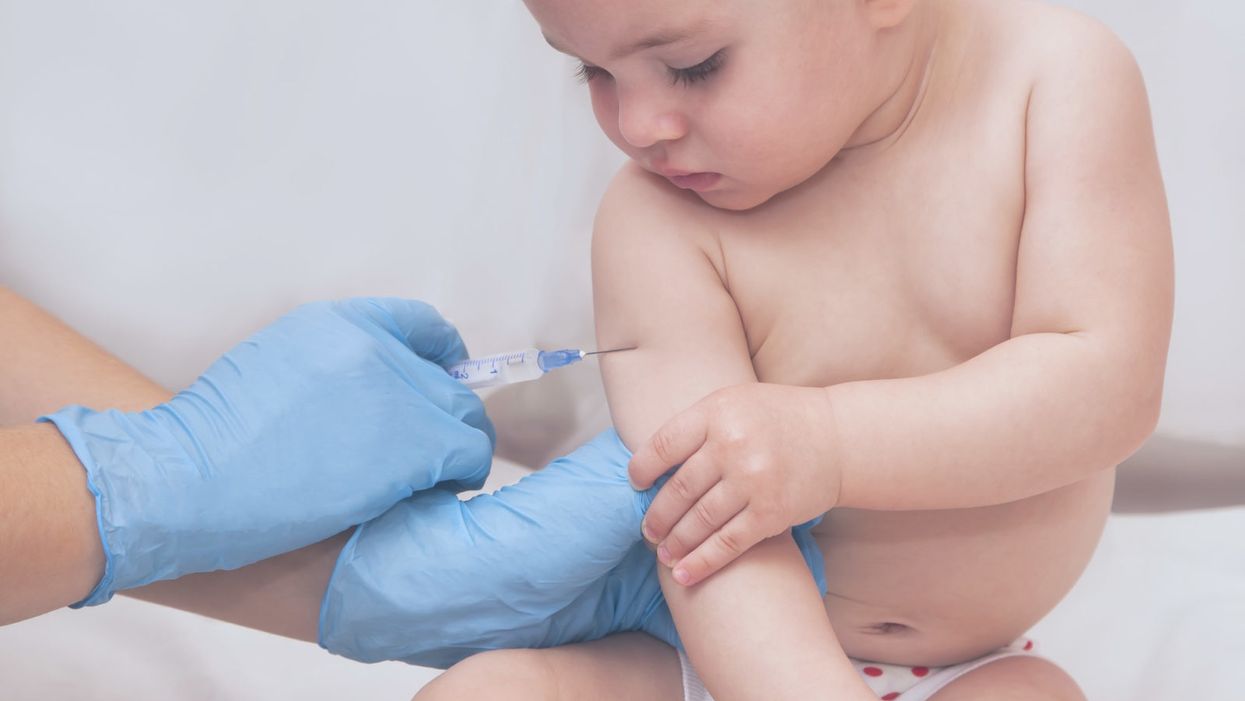New Options Are Emerging in the Search for Better Birth Control

A decade ago, Elizabeth Summers' options for birth control suddenly narrowed. Doctors diagnosed her with Factor V Leiden, a rare genetic disorder, after discovering blood clots in her lungs. The condition increases the risk of clotting, so physicians told Summers to stay away from the pill and other hormone-laden contraceptives. "Modern medicine has generally failed to provide me with an effective and convenient option," she says.
But new birth control options are emerging for women like Summers. These alternatives promise to provide more choices to women who can't ingest hormones or don't want to suffer their unpleasant side effects.
These new products have their own pros and cons. Still, doctors are welcoming new contraceptives following a long drought in innovation. "It's been a long time since we've had something new in the world of contraception," says Heather Irobunda, an obstetrician and gynecologist at NYC Health and Hospitals.
On social media, Irobunda often fields questions about one of these new options, a lubricating gel called Phexxi. San Diego-based Evofem, the company behind Phexxi, has been advertising the product on Hulu and Instagram after the gel was approved by the Food and Drug Administration in May 2020. The company's trendy ads target women who feel like condoms diminish the mood, but who also don't want to mess with an IUD or hormones.
Here's how it works: Phexxi is inserted via a tampon-like device up to an hour before sex. The gel regulates vaginal pH — essentially, the acidity levels — in a range that's inhospitable to sperm. It sounds a lot like spermicide, which is also placed in the vagina prior to sex to prevent pregnancy. But spermicide can damage the vagina's cell walls, which can increase the risk of contracting sexually transmitted diseases.
"Not only is innovation needed, but women want a non-hormonal option."
Phexxi isn't without side effects either. The most common one is vaginal burning, according to a late-stage trial. It's also possible to develop a urinary tract infection while using the product. That same study found that during typical use, Phexxi is about 86 percent effective at preventing pregnancy. The efficacy rate is comparable to condoms but lower than birth control pills (91 percent) and significantly lower than an IUD (99 percent).
Phexxi – which comes in a pack of 12 – represents a tiny but growing part of the birth control market. Pharmacies dispensed more than 14,800 packs from April through June this year, a 65 percent increase over the previous quarter, according to data from Evofem.
"We've been able to demonstrate that not only is innovation needed, but women want a non-hormonal option," says Saundra Pelletier, Evofem's CEO.
Beyond contraception, the company is carrying out late-stage tests to gauge Phexxi's effectiveness at preventing the sexually transmitted infections chlamydia and gonorrhea.

Phexxi is inserted via a tampon-like device up to an hour before sex.
Phexxi
A New Pill
The first birth control pill arrived in 1960, combining the hormones estrogen and progestin to stop sperm from joining with an egg, giving women control over their fertility. Subsequent formulations sought to ease side effects, by way of lower amounts of estrogen. But some women still experience headaches and nausea – or more serious complications like blood clots. On social media, women recently noted that birth control pills are much more likely to cause blood clots than Johnson & Johnson's COVID-19 vaccine that was briefly paused to evaluate the risk of clots in women under age 50. What will it take, they wondered, for safer birth control?
Mithra Pharmaceuticals of Belgium sought to create a gentler pill. In April, the FDA approved Mithra's Nextstellis, which includes a naturally occurring estrogen, the first new estrogen in the U.S. in 50 years. Nextstellis selectively acts on tissues lining the uterus, while other birth control pills have a broader target.
A Phase 3 trial showed a 98 percent efficacy rate. Andrew London, an obstetrician and gynecologist, who practices at several Maryland hospitals, says the results are in line with some other birth control pills. But, he added, early studies indicate that Nextstellis has a lower risk of blood clotting, along with other potential benefits, which additional clinical testing must confirm.
"It's not going to be worse than any other pill. We're hoping it's going to be significantly better," says London.
The estrogen in Nexstellis, called estetrol, was skipped over by the pharmaceutical industry after its discovery in the 1960s. Estetrol circulates between the mother and fetus during pregnancy. Decades later, researchers took a new look, after figuring out how to synthesize estetrol in a lab, as well as produce estetrol from plants.
"That allowed us to really start to investigate the properties and do all this stuff you have to do for any new drug," says Michele Gordon, vice president of marketing in women's health at Mayne Pharma, which licensed Nextstellis.
Bonnie Douglas, who followed the development of Nextstellis as part of a search for better birth control, recently switched to the product. "So far, it's much more tolerable," says Douglas. Previously, the Midwesterner was so desperate to find a contraceptive with fewer side effects that she turned to an online pharmacy to obtain a different birth control pill that had been approved in Canada but not in the U.S.
Contraceptive Access
Even if a contraceptive lands FDA approval, access poses a barrier. Getting insurers to cover new contraceptives can be difficult. For the uninsured, state and federal programs can help, and companies should keep prices in a reasonable range, while offering assistance programs. So says Kelly Blanchard, president of the nonprofit Ibis Reproductive Health. "For innovation to have impact, you want to reach as many folks as possible," she says.
In addition, companies developing new contraceptives have struggled to attract venture capital. That's changing, though.
In 2015, Sabrina Johnson founded DARÉ Bioscience around the idea of women's health. She estimated the company would be fully funded in six months, based on her track record in biotech and the demand for novel products.
But it's been difficult to get male investors interested in backing new contraceptives. It took Johnson two and a half years to raise the needed funds, via a reverse merger that took the company public. "There was so much education that was necessary," Johnson says, adding: "The landscape has changed considerably."
Johnson says she would like to think DARÉ had something to do with the shift, along with companies like Organon, a spinout of pharma company Merck that's focused on reproductive health. In surveying the fertility landscape, DARÉ saw limited non-hormonal options. On-demand options – like condoms – can detract from the moment. Copper IUDs must be inserted by a doctor and removed if a woman wants to return to fertility, and this method can have onerous side effects.
So, DARÉ created Ovaprene, a hormone-free device that's designed to be inserted into the vagina monthly by the user. The mesh product acts as a barrier, while releasing a chemical that immobilizes sperm. In an early study, the company reported that Ovaprene prevented almost all sperm from entering the cervical canal. The results, DARÉ believes, indicate high efficacy.
A late-stage study, slated to kick off next year, will be the true judge. Should Ovaprene eventually win regulatory approval, drug giant Bayer will handle commercializing the device.
Other new forms of birth control in development are further out, and that's assuming they perform well in clinical trials. Among them: a once-a-month birth control pill, along with a male version of the birth control pill. The latter is often brought up among women who say it's high time that men take a more proactive role in birth control.
For Summers, her search for a safe and convenient birth control continues. She tried Phexxi, which caused irritation. Still, she's excited that a non-hormonal option now exists. "I'm sure it will work for others," she says.
Forcing Vaccination on Every Child Undermines Civil Liberties
The author's son Chris, at two years old in the summer of 1980, before his 4th DPT shot.
[Editor's Note: This opinion essay is in response to our current Big Question, which we posed to experts with different viewpoints: "Where should society draw the line between requiring vaccinations for children and allowing parental freedom of choice?"]
Our children are the future. The survival of humanity is advanced by the biological imperative that mothers and fathers want and need to protect their children and other children from being harmed for any reason.
Science is not perfect, doctors are not infallible, and medical interventions come with risks.
In the 21st century, consensus science considers vaccination to be one of the greatest inventions in the history of medicine and the greatest achievement of public health programs. The national vaccination rate for U.S. kindergarten children is 94 percent and most children today receive 69 doses of 16 federally recommended vaccines. However, public health is not simply measured by high vaccination rates and absence of infectious disease, which is evidenced by the chronic inflammatory disease and disability epidemic threatening to bankrupt the U.S. health care system.
Science is not perfect, doctors are not infallible, and medical interventions come with risks, which is why parents have the power to exercise informed consent to medical risk taking on behalf of their minor children.
As a young mother, I learned that vaccine risks are 100 percent for some children because, while we are all born equal under the law, we are not born all the same. Each one of us enters this world with different genes, a unique microbiome and epigenetic influences that affect how we respond to the environments in which we live. We do not all respond the same way to infectious diseases or to pharmaceutical products like vaccines.
Few parents were aware of vaccine side effects in 1980, when my bright, healthy two-and-a-half year-old son, Chris, suffered a convulsion, collapse, and state of unconsciousness (encephalopathy) within hours of his fourth DPT shot, and then regressed physically, mentally and emotionally and became a totally different child. Chris was eventually diagnosed with multiple learning disabilities and confined to a special education classroom throughout his public school education, but he and I both know his vaccine reaction could have been much worse. Today, Chris is an independent adult but many survivors of brain injury are not.

Barbara Loe Fisher and her son, Chris, in December 1981 after his fourth DPT shot.
(Courtesy Fisher)
The public conversation about several hundred cases of measles reported in the U.S. this year is focused on whether every parent has a social obligation to vaccinate every child to maintain "community immunity," but vaccine failures are rarely discussed. Emerging science reveals that there are differences in naturally and vaccine acquired immunity, and both vaccinated and unvaccinated children and adults transmit infections, sometimes with few or no symptoms.
Nearly 40 percent of cases reported in the 2015 U.S. measles outbreak occurred in recently vaccinated individuals who developed vaccine reactions that appeared indistinguishable from measles. Outbreaks of pertussis (whooping cough) in highly vaccinated child populations have been traced to waning immunity and evolution of the B. pertussis microbe to evade the vaccines. Influenza vaccine effectiveness was less than 50 percent in 11 of the past 15 flu seasons.
Vaccine policymakers recognize that children with severe combined immune deficiency or those undergoing chemotherapy or organ transplants are at increased risk for complications of infectious diseases and vaccines. However, there is no recognition of the risks to healthy infants and children with unidentified susceptibility to vaccine reactions, including children whose health suddenly deteriorates without explanation after vaccination. Medical care is being denied to children and adults in the U.S. if even one government recommended vaccination is declined, regardless of health or vaccine reaction history.
When parents question the risks and failures of a commercial pharmaceutical product being mandated for every child, the answer is not more force but better science and respect for the informed consent ethic.
The social contract we have with each other when we live in communities, whether we belong to the majority or a minority, is to care about and protect every individual living in the community. One-size-fits-all vaccine policies and laws, which fail to respect biodiversity and force everyone to be treated the same, place an unequal risk burden on a minority of unidentified individuals unable to survive vaccination without being harmed.
A law that requires certain minorities to bear a greater risk of injury or sacrifice their lives in service to the majority is not just or moral.
Between 1991 and 2013, the Institute of Medicine (IOM) published reports documenting that vaccines can cause brain inflammation and other serious reactions, injuries and death. A 2012 IOM report acknowledged that there are genetic, biological, and environmental risk factors that make some individuals more susceptible to adverse responses to vaccines but often doctors cannot identify who they are because of gaps in vaccine science. Congress acknowledged this fact a quarter century earlier in the 1986 National Childhood Vaccine Injury Act, which created a federal vaccine injury compensation program alternative to a lawsuit that has awarded more than $4 billion to vaccine-injured children and adults.
We give up the human right to autonomy and informed consent at our peril, no matter where or in what century we live.
Vaccine manufacturers and administrators have liability protection, yet today almost no health condition qualifies for a medical vaccine exemption under government guidelines. Now, there is a global call by consensus science advocates for elimination of all personal belief vaccine exemptions and censorship of books and public conversations that criticize vaccine safety or government vaccine policy. Some are calling for quarantine of all who refuse vaccinations and criminal prosecution, fines and imprisonment of parents with unvaccinated children, as well as punishment of doctors who depart from government policy.
There is no civil liberty more fundamentally a natural, inalienable right than exercising freedom of thought and conscience when deciding when and for what reason we are willing to risk our life or our child's life. That is why voluntary, informed consent to medical risk-taking has been defined as a human right governing the ethical practice of modern medicine.
In his first Presidential inaugural address, Thomas Jefferson warned:
"All, too, will bear in mind this sacred principle, that though the will of the majority is in all cases to prevail, that will to be rightful must be reasonable; that the minority posses their equal rights, which equal law must protect, and to violate would be oppression."
The seminal 1905 U.S. Supreme Court decision, Jacobson v. Massachusetts, affirmed the constitutional authority of states to enact mandatory smallpox vaccination laws. However, the justices made it clear that implementation of a vaccination law should not become "cruel and inhuman to the last degree." They warned, "All laws, this court has said, should receive a sensible construction. General terms should be so limited in their application as not to lead to injustice, oppression, or an absurd consequence. It will always, therefore, be presumed that the legislature intended exceptions to its language, which would avoid results of this character."
Mothers and fathers, who know and love their children better than anyone else, depend upon sound science and compassionate public health policies to help them protect their own and other children from harm. If individuals susceptible to vaccine injury cannot be reliably identified, the accuracy of vaccine benefit and risk calculations must be reexamined. Yet, consensus science and medicine around vaccination discourages research into the biological mechanisms of vaccine injury and death and identification of individual risk factors to better inform public health policy.
A critic of consensus science, physician and author Michael Crichton said, "Let's be clear: the work of science has nothing whatever to do with consensus. Consensus is the business of politics. Period."
Condoning elimination of civil liberties, including freedom of speech and the right to dissent guaranteed under the First Amendment of the U.S. Constitution, to enforce vaccination creates a slippery slope. Coercion, punishment and censorship will destroy, not instill, public trust in the integrity of medical practice and public health laws.
There are more than a dozen new vaccines being fast tracked to market by industry and governments. Who in society should be given the power to force all children to use every one of them without parental consent regardless of how small or great the risk?
We give up the human right to autonomy and informed consent at our peril, no matter where or in what century we live. Just and compassionate public health laws that protect parental and human rights will include flexible medical, religious and conscientious belief vaccine exemptions to affirm the informed consent ethic and prevent discrimination against vulnerable minorities.
[Editor's Note: Read the opposite viewpoint here.]
Not Vaccinating Your Kids Endangers Public Health
A pediatrician gives a one-year-old child a vaccine.
[Editor's Note: This opinion essay is in response to our current Big Question, which we posed to experts with different viewpoints: "Where should society draw the line between requiring vaccinations for children and allowing parental freedom of choice?"]
Society has a right and at times an obligation to require children to be vaccinated. Vaccines are one of the most effective medical and public health interventions. They save lives and prevent suffering. The vast majority of parents in the United States fully vaccinate their children according to the recommended immunization schedule. These parents are making decisions so that the interests of their children and the interest of society are the same. There are no ethical tensions.
"Measles is only a plane ride away from American children."
A strong scientific basis supports the recommended immunization schedule. The benefits of recommended vaccines are much bigger than the risks. However, a very small proportion of parents are ideologically opposed to vaccines. A slightly larger minority of parents do not believe that all of the recommended vaccines are in their child's best interests.
Forgoing vaccinations creates risk to the child of contracting diseases. It also creates risk to communities and vulnerable groups of people who cannot be vaccinated because of their age or health status.
For example, many vaccines are not able to be given to newborns, such as the measles vaccine which is recommended at 12-15 months of age, leaving young children vulnerable. Many diseases are particularly dangerous for young children. There are also some children who can't be vaccinated, such as pediatric cancer patients who are undergoing chemotherapy or radiation treatment. These children are at increased risk of serous complication or death.
Then there are people who are vaccinated but remain susceptible to disease because no vaccine is 100% effective. In the case of measles, two doses of vaccines protect 97% of people, leaving 3% still susceptible even after being fully vaccinated. All of these groups of people – too young, not eligible, and vaccinated but still susceptible – are dependent on almost everyone else to get vaccinated in order for them to be protected.
Sadly, even though measles has been largely controlled because most people get the very safe and very effective vaccine, we are now seeing dangerous new outbreaks because some parents are refusing vaccines for their children, especially in Europe. Children have died. Measles is only a plane ride away from American children.
There have been repeated measles outbreaks in the United States – such as the Disneyland outbreak and six outbreaks already this year - because of communities where too many parents refuse the vaccine and measles is brought over, often from Europe.
The public health benefits cannot be emphasized enough: Vaccines are not just about protecting your child. Vaccines protect other children and the entire community. Vaccine-preventable diseases (with the exception of tetanus) are spread from person to person. The decision of a parent to not vaccinate their child can endanger other children and vulnerable people.
As a vaccine safety researcher for 20 years, I believe that the community benefit of vaccination can provide justification to limit parental autonomy.
Given these tensions between parental autonomy and the protective value of vaccines, the fundamental question remains: Should society require all children to submit to vaccinations? As a vaccine safety researcher for 20 years, I believe that the community benefit of vaccination can provide justification to limit parental autonomy.
In the United States, we see this balancing act though state requirements for vaccinations to enter school and the varying availability of non-medical exemptions to these laws. Mandatory vaccination in the United States are all state laws. All states require children entering school to receive vaccines and permit medical exemptions. There are a lot of differences between states regarding which vaccines are required, target populations (daycare, school entry, middle school, college), and existence and types of non-medical (religious or philosophical) exemptions that are permitted.
Amid recent measles outbreaks, for instance, California eliminated all non-medical exemptions, making it one of three states that only permit medical exemptions. The existence and enforcement of these school laws reflect broad public support for vaccines to protect the community from disease outbreaks.
I worry about how many kids must suffer, and even die, from diseases like measles until enough is enough. Such tragedies have no place in the modern era. All parents want to do right by their children. All parents deserve autonomy when it comes to decision-making. But when their choices confer serious risks to others, the buck should stop. Our nation would be better off—both medically and ethically—if we did not turn our backs on our most vulnerable individuals.
[Editor's Note: Read the opposite viewpoint here.]

